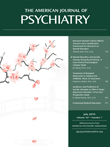Pregabalin Abuse, Dependence, and Withdrawal: A Case Report
To the Editor: Pregabalin is a novel gamma-aminobutyric acid (GABA) analog that is approved for the treatment of neuropathic pain and partial-onset seizures. While there are reports about the addictive potential of another novel antiepileptic drug (gabapentin [1, 2]), we present the first case of pregabalin dependence.
"Mr. B" was a 47-year-old man who asked for admission to the department for addiction medicine. At the time of his admission, he was consuming 25 capsules (equivalent to 7,500 mg) of pregabalin per day as well as alcohol and cannabis at irregular intervals. Attempting to wean himself off pregabalin, he developed vegetative withdrawal symptoms, including sweating, unrest, arterial hypertension, tremor, and craving for pregabalin. He fulfilled all seven DSM-IV dependence criteria. The patient reported a history of alcohol and cannabis abuse as well as heroin dependence but had been abstinent from heroin since he was released from prison 7 years ago. Two years ago, a friend suffering from neuropathic pain recommended that he use pregabalin, which in high doses would induce "very good feelings." Mr. B took some pregabalin capsules and experienced euphoric feelings. In the following weeks, his pregabalin use became regular, and he developed tolerance and withdrawal symptoms, which is why he finally increased the dosage to 25 capsules per day.
After admission to the unit, the patient's withdrawal symptoms were only insufficiently controlled by benzodiazepines. On the first day, we had to add pregabalin in high doses to achieve significant clinical improvement. His blood analysis immediately after admission showed a pregabalin level of 29 mg/l (therapeutic range: 0.5–16 mg/l). A breathalyzer test for alcohol was negative, urine drug test was positive for cannabis, and the patient stated that alcohol withdrawal symptoms were unknown to him. Standard laboratory, ECG, cranial magnetic resonance imaging, and abdominal ultrasound results were without pathological findings. An EEG revealed general alterations, probably because of the pregabalin's effect. Consecutively, pregabalin capsules were slowly reduced by two capsules a day. Within 12 days, Mr. B's plasma levels decreased from 29 mg/l to 9.8 mg/l. He repeatedly complained of a heavy craving for pregabalin, discontinued the treatment prematurely, and relapsed immediately at home by taking 20 capsules of the drug. Further attempts to motivate him for detoxification in our outpatient unit failed, and he continued taking up to 20 capsules per day.
Pregabalin is a GABA-analog that selectively binds to the alpha2 delta subunit of voltage-gated calcium channels. It inhibits the release of excitatory neurotransmitters and increases neuronal GABA levels. Like some other compounds that modulate GABA-ergic neurotransmission, pregabalin might have a potential for abuse. Our patient had a history of drug addiction, which may be important in the reward effect of pregabalin. We therefore recommend being especially cautious when using pregabalin to treat patients with a history of drug or alcohol dependence.
1 : Gabapentin abuse, and delirium tremens upon gabapentin withdrawal. J Clin Psychiatry 2007; 68:483–484 Crossref, Medline, Google Scholar
2 : Abuse, dependency and withdrawal with gabapentin: a first case report. Pharmacopsy 2007; 40:43–44 Crossref, Medline, Google Scholar



